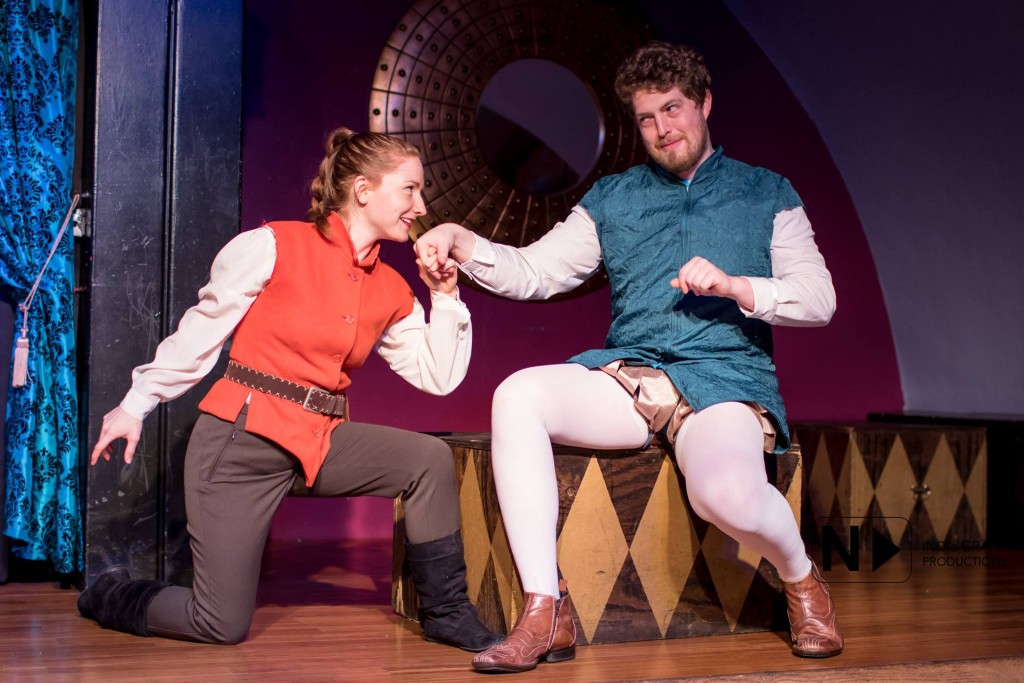
“My breast has stirr’d in thee, fine boy, and I
Am render’d simple. Tongue nor supple brain
Can tell what artistry lives in thine eyes.”
Aquiline (Megan Gilmore) woos the fair Cordelius (Jack Sharkey), in Act 2, Scene 2 of The Wayward Women (Thursdays, Fridays, and Saturdays as 7:00pm, at Mary’s Attic, 5400 N Clark St).
Perhaps not surprisingly, Aquiline’s wooing of Cordelius mirrors Hal’s wooing of Katherine, though it lacks the sinister undertones of conquest. Like Katherine, Cordelius has been removed from his seat of power and is very much a fish out of water. Like Katherine, he does not trust his wooer’s intentions. And most tellingly like Katherine, Cordelius is concerned that his potential paramour’s words of love are salted with domination. The Swiss gentleman does not like to be made to feel unmanly, and he is clearly used to being the hero of his own story (as well as everyone else’s story).
It’s in this respect, I think, that The Wayward Women most overtly comments on gender roles in Shakespeare. Cordelius serves as the primary love interest of more than one character. Consequently, though he is often the center of everyone’s conversations (so much so that this six-women-to-four-men play strains the Bechdal Test), he is granted very little agency in his own fate.
A woman’s lack of agency in Shakespeare is, I think, most evident in his histories. Katherine’s demurring to Hal brings us a happy ending with a ‘proper’ queen. Margaret’s refusal to submit to Henry VI brings us a three-play tragedy (though King Henry VI himself is also indicted, the “unmanly” king to Margaret’s “unwomanly” queen, which has its comic parallel in Joan of Arc and the Dauphin). You can of course also see this in Taming of the Shrew’s Kate or the older noblewomen of Richard III and King John. Shakespeare does occasionally throw a bone to a woman’s intellect with Beatrice or the Princess of France or either Rosalind, and of course many of the ‘howling stereotypes’ are more complicated than they initially appear, but one need look no farther than Luciana and Adriana (at the beginning of his career) or Miranda and Sycorax (and the end) to conclude how ‘proper womanhood’ was generally defined in Elizabethan and Jacobean England, at least in their literature. It’s these standards that are applied to Cordelius, and he does not care for it. Not one bit. Unlike most of Shakespeare’s women, however, Cordelius is granted the right to complain of the inequity of it all.
In this little scene, Quill (Aquiline) echos Hal’s tripping tongue, though her desire is motivated solely by strict romanticism and not by political convenience. Indeed, Quill’s concerns of being forced to marry Cordelius after enjoying his fruits are soundly squashed by Dame Grendela (Quill’s personal Falstaff) in the previous scene. With echos of Romeo and Troilus, Quill is a direct contrast to a woman’s romantic agency in Shakespeare’s work, where our best examples of female independence (in matters of wooing) come again from Queen Margaret (accomplice in a premeditated affair) and Tamara (the same), both of whom are depicted as immoral and even “unnatural.” Later in Shakespeare’s career, sexual independence can be found minutely in Lear’s elder daughters, both of whom are directly called “unnatural hags.” Shakespeare may have held the mirror up to nature, but that mirror was certainly not always a flattering one, frequently revealing the prejudices of the times. To be fair, he commented on those prejudices as well, and some of his independent *and* intelligent women came to happy ends (Rosalind, Beatrice, and arguably Adriana and even Bianca).
COSTUMES by Delena Bradley
LIGHTING by Benjamin Dionysus
PHOTO by iNDie Grant Productions
